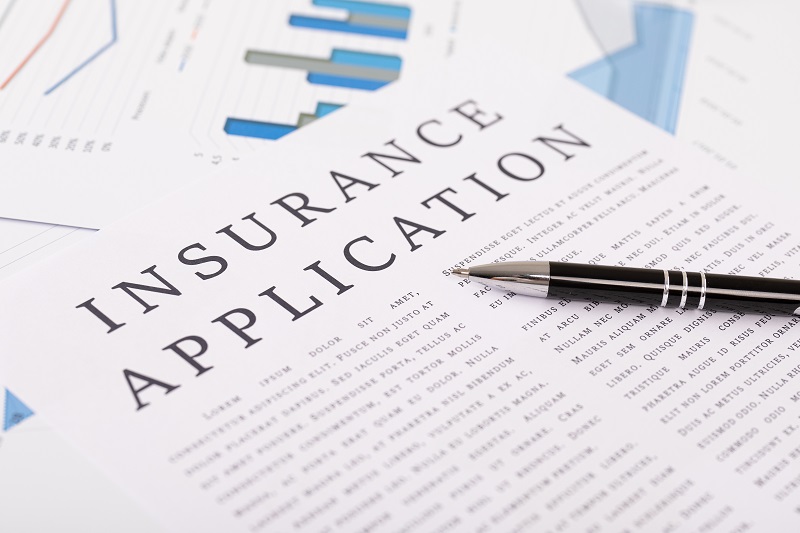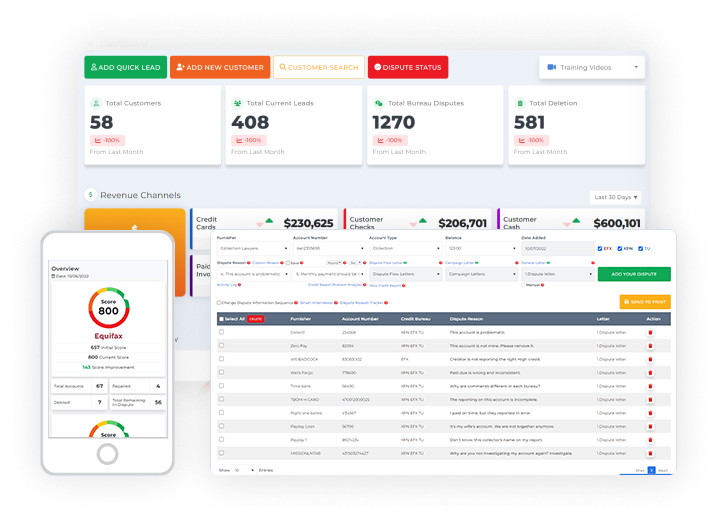If you’re thinking about starting a credit repair business in Delaware, it’s important to understand the legal landscape you’ll be operating in. This article will provide you with a comprehensive guide to the laws and regulations that govern credit repair in Delaware, so you can launch your business with confidence and stay compliant with state laws.
Familiarize Yourself with Federal Laws

Understand and comply with the federal Credit Repair Organizations Act (CROA) and the Fair Credit Reporting Act (FCRA), as they dictate how credit repair companies can operate in the United States.
Credit Repair Organizations Act (CROA):
This act provides a set of guidelines and regulations for credit repair companies, aiming to protect consumers from deceptive and fraudulent practices. Key provisions of the CROA include:
- Prohibiting companies from making false or misleading claims about their services.
- Requiring companies to provide a written contract to consumers, outlining the services to be provided, costs, and duration.
- Providing consumers with the right to cancel the contract within three days of signing.
- Barring companies from charging fees in advance for their services.
Fair Credit Reporting Act (FCRA):
This act aims to promote the accuracy, fairness, and privacy of information in the files of consumer reporting agencies. It stipulates the responsibilities of credit repair companies when handling clients’ credit information. Key provisions of the FCRA include:
- Giving consumers the right to know what is in their credit report.
- Allowing consumers to dispute incomplete or inaccurate information.
- Limiting access to credit reports to parties with a legitimate need for the information.
- Requiring consumer reporting agencies to investigate consumer disputes within 30 days.
Register Your Business

Choose a business structure (e.g., sole proprietorship, LLC, corporation) and register your business with the Delaware Division of Corporations. You will need to choose a business name and obtain an EIN (Employer Identification Number) from the IRS.
Online:
The Delaware Division of Corporations offers an online filing system called “Corporate Document e-Filing.” To access the system, visit the Division of Corporations’ website. Select the appropriate form for your business structure (Certificate of Formation for an LLC or Certificate of Incorporation for a corporation) and follow the instructions to complete and submit the form electronically. You will also need to pay the required filing fee online.
By Mail:
You can also submit your completed Certificate of Formation (for an LLC) or Certificate of Incorporation (for a corporation) by mail. Download the relevant form from the Division of Corporations’ website, complete it, and mail the form along with a check for the required filing fee to the following address:
Delaware Division of Corporations
John G. Townsend Building
401 Federal Street – Suite 4
Dover, DE 19901
In-person:
If you prefer to submit your documents in person, you can visit the Delaware Division of Corporations office at the following address:
Delaware Division of Corporations
John G. Townsend Building
401 Federal Street – Suite 4
Dover, DE 19901
Choose A Business Structure:
Decide if you want to register your credit repair business as a limited liability company (LLC) or a corporation. Consult with a legal or financial professional to help you make the best decision for your specific situation.
Choose A Business Name:
Select a unique name for your business that is not already in use by another Delaware entity. You can conduct a preliminary name search using the Delaware Division of Corporations online database.
For an LLC:
- Prepare and file a Certificate of Formation: To register an LLC, you’ll need to prepare a Certificate of Formation. This document typically includes information such as the LLC name, registered agent’s name and address, and organizer’s name and address.
- Choose a registered agent: A registered agent is a person or entity authorized to receive legal documents on behalf of the LLC. The registered agent must have a physical address in Delaware.
- Submit the Certificate of Formation: File the completed Certificate of Formation with the Delaware Division of Corporations, along with the required filing fee. This can be done online, by mail, or in person.
For a Corporation:
- Prepare and file a Certificate of Incorporation: To register a corporation, you’ll need to prepare a Certificate of Incorporation. This document typically includes information such as the corporation’s name, the registered agent’s name and address, the number of authorized shares, and the incorporator’s name and address.
- Choose a registered agent: Similar to an LLC, a corporation needs a registered agent who is authorized to receive legal documents on behalf of the corporation. The registered agent must have a physical address in Delaware.
- Submit the Certificate of Incorporation: File the completed Certificate of Incorporation with the Delaware Division of Corporations, along with the required filing fee. This can be done online, by mail, or in person.
Once your business is registered with the Delaware Division of Corporations, proceed with other necessary steps, such as obtaining an EIN, a Delaware business license, and any required local permits or licenses. Additionally, ensure your credit repair business complies with all federal and state laws.
Delaware Business License

Obtain a Delaware business license from the Delaware Division of Revenue. This may require providing information about your business structure, location, and ownership.
Complete A Business License Application:
You can apply for a Delaware business license online through the One Stop Business Licensing and Registration Portal. You can also download the appropriate application form from the Division of Revenue’s website and submit it by mail or in person.
Provide Necessary Information:
When completing the application, you will be asked to provide information about your business structure, location, ownership, and nature of the business. Ensure that all information is accurate and complete.
Pay The Required Fee:
The Delaware business license application requires payment of a fee. The fee amount varies depending on the nature of the business and the location. Consult the Division of Revenue’s website or contact them directly to determine the appropriate fee for your credit repair business.
Submit The Application:
If you are applying online, follow the instructions on the One Stop Business Licensing and Registration portal to submit your application and pay the required fee. If you are submitting a paper application, mail or deliver it in person, along with the required fee, to the appropriate Division of Revenue office.
Await Approval:
Once the Division of Revenue has received your application and fee, they will review your application. Upon approval, you will receive your Delaware business license.
Local Permits and Licenses

Check with your city and county government offices to see if any additional permits or licenses are required for your credit repair business.
Contact Your City or County Government Offices:
Reach out to your local city or county government offices, such as the City Clerk’s Office, City Hall, or County Administration Building, to inquire about any necessary permits or licenses for a credit repair business in your area.
Research Zoning and Land Use Regulations:
Check with your local zoning or planning department to ensure that your credit repair business complies with any zoning and land use regulations in your location.
Obtain Any Required Local Permits or Licenses:
If your city or county requires additional permits or licenses for your credit repair business, be sure to apply for and obtain them before starting your business operations.
Stay Informed About Local Regulations:
Keep up to date with any changes to local regulations or requirements that may affect your credit repair business.
Obtain A Surety Bond

Delaware might require credit repair businesses to obtain a surety bond to protect clients from fraud or unethical practices. Check with your state’s consumer protection agency to confirm the bonding requirements.
The Delaware Credit Services Organization Bond is required by the Delaware Secretary of State. The Surety Bond must be filed in addition to the registration application in order to conduct business in Delaware. The required bond amount is $15,000.
Understand State Laws

Familiarize yourself with Delaware’s consumer protection laws, including the Delaware Consumer Fraud Act and the Uniform Debt-Management Services Act, to ensure your business complies with state regulations.
Delaware Consumer Fraud Act (Title 6, Chapter 25 of the Delaware Code):
The Delaware Consumer Fraud Act aims to protect consumers from deceptive trade practices, unfair competition, and other fraudulent actions. The act applies to the sale, lease, or advertisement of goods and services to consumers. It prohibits a range of deceptive trade practices, including but not limited to:
- Misrepresenting the quality, characteristics, or benefits of a product or service
- False advertising
- Charging for goods or services without the consumer’s consent
- Misleading consumers about prices or terms of sale
- Failing to disclose relevant information about products or services
Violations of the Consumer Fraud Act can lead to legal action by the Attorney General’s office or private lawsuits by affected consumers.
Uniform Debt-Management Services Act (Title 6, Chapter 24A of the Delaware Code):
The Uniform Debt-Management Services Act regulates the conduct of businesses providing debt-management services to consumers in Delaware. This includes credit counseling, debt settlement, and other services aimed at assisting consumers in managing their debts. Key provisions of the act include:
- Requiring debt-management service providers to obtain a license from the Delaware Department of Justice
- Mandating that providers maintain a surety bond or other financial security
- Imposing strict disclosure requirements for advertising and service agreements
- Prohibiting providers from engaging in deceptive or abusive practices
- Requiring providers to maintain separate accounts for client funds
- Establishing a fee structure for debt-management services
Violation of the Uniform Debt-Management Services Act can result in license revocation, fines, and other penalties.
Create A Contract

Develop a legally compliant contract for your clients, outlining the services you provide, cancellation policy, and other relevant terms. Consult a lawyer to ensure your contract complies with both state and federal laws.
A Detailed Description of Services:
Clearly outline the services you will provide to the client, including the specific actions you will take to help them repair their credit.
Duration Of the Contract:
Specify the duration of the contract, indicating the start and end dates for your services.
Cost And Payment Terms:
Clearly state the total cost of your services, the payment terms, and any additional fees or charges that may apply.
Cancellation Rights:
Under the CROA, consumers have the right to cancel the credit repair contract within three days of signing it. Ensure that your contract includes a clear explanation of this right and the procedure for canceling the contract.
Prohibition Of Advance Fees:
The CROA prohibits credit repair companies from charging fees in advance for their services. Make sure your contract complies with this requirement by specifying that payment is due only after services have been provided.
Disclosures:
Include all required federal disclosures, such as the consumer’s right to dispute inaccurate information on their credit report, the availability of nonprofit credit counseling services, and the fact that the client can perform many credit repair actions themselves without hiring a professional service.
Company Information:
Provide your company’s name, address, and contact information in the contract.
Set Up A Professional Website And Marketing Materials

Create a professional online presence, including a website and marketing materials, to help establish credibility and attract clients.
Choose A Domain Name:
Select a domain name that is relevant, easy to remember, and represents your business well. Register the domain through a domain registrar.
Website Hosting:
Choose a reliable web hosting service that offers good uptime, customer support, and the features you need to build and maintain your website.
Web Design:
Design a professional-looking website that is easy to navigate and visually appealing. You can either hire a web designer, use a website builder, or learn web design yourself.
Content Creation:
Create informative, engaging, and relevant content for your website. Include information about your services, company background, and contact information. Make sure the content is well-written, clear, and concise.
Search Engine Optimization (SEO):
Optimize your website for search engines by using relevant keywords, creating quality content, and building a good website structure. This will help improve your website’s visibility on search engine results pages.
Compliance With Laws and Regulations:
Ensure that your website and marketing materials comply with federal laws like the Credit Repair Organizations Act (CROA) and the Fair Credit Reporting Act (FCRA), as well as any applicable state laws. This includes not making false or misleading claims about your services, clearly outlining fees and contract terms, and providing necessary disclosures.
Marketing Materials:
Create marketing materials, such as brochures, business cards, and flyers, that accurately represent your business and services. Ensure that these materials also comply with federal and state regulations.
Social Media Presence:
Establish a presence on social media platforms to engage with potential clients and promote your services. Be transparent and professional when interacting with users on these platforms.
Monitor And Update Your Website:
Regularly update your website with new content and ensure that all information remains accurate and up-to-date.
Educate Yourself on Credit Repair Techniques

Stay up-to-date on the latest credit repair strategies, industry best practices, and changes in relevant laws and regulations. This will help ensure you provide the best possible service to your clients.
Industry Associations:
Join credit repairs industry associations, such as the National Association of Credit Services Organizations (NACSO) or the Credit Consultants Association (CCA). These organizations often provide valuable resources, updates, and educational materials to their members.
Industry Conferences and Events:
Attend credit repair conferences, webinars, and networking events to learn about new developments, strategies, and best practices. These events also offer the opportunity to connect with other professionals in the industry.
Trade Publications and Websites:
Subscribe to credit repair industry publications, newsletters, and websites to stay informed about the latest trends, news, and changes in the industry.
Professional Training and Certification:
Enroll in credit repair training courses or pursue certification programs to enhance your skills and knowledge. Many organizations offer specialized training and certifications tailored to the credit repair industry.
Legal Updates:
Keep track of changes in federal and state laws and regulations that affect the credit repair industry. Consult legal professionals, subscribe to legal newsletters, or follow reputable law firms that specialize in credit repair and consumer protection law.
Networking:
Connect with other credit repair professionals and join online forums, social media groups, and discussion boards related to the industry. Sharing experiences and knowledge with others can help you stay updated on best practices and strategies.
Monitoring Regulatory Agencies:
Stay informed about updates from relevant regulatory agencies, such as the Federal Trade Commission (FTC) and the Consumer Financial Protection Bureau (CFPB). These agencies often publish guidelines, enforcement actions, and changes in regulations that can affect the credit repair industry.
Continuing Education:
Participate in continuing education programs or workshops focused on credit repair, financial counseling, or consumer protection law. This can help you expand your knowledge and stay informed about the latest industry practices.
Stay Informed About Credit Scoring Models:
Keep up with updates to credit scoring models like FICO and Vantage Score, as changes to these models can impact credit repair strategies.
Obtain Necessary Insurance

Depending on your business structure and location, you may need to obtain general liability insurance and/or professional liability insurance to protect your business against potential claims or lawsuits.
General Liability Insurance:
This insurance covers claims of bodily injury, property damage, and personal injury (e.g., slander or libel) that may arise from your business operations.
Professional Liability Insurance (Errors & Omissions):
This insurance protects your business from claims related to negligence, errors, or omissions in the services you provide. It is particularly important for credit repair businesses, as it can cover costs related to disputes or legal actions arising from your services.
Commercial Property Insurance:
This insurance covers damage to or loss of your business property, such as office equipment, furniture, and inventory, due to events like theft, fire, or natural disasters.
Cyber Liability Insurance:
Since credit repair businesses handle sensitive client information, it’s crucial to protect against potential cyber threats. Cyber liability insurance covers costs related to data breaches, cyberattacks, and other cyber risks.
Workers' Compensation Insurance:
If you have employees, you may be required to carry workers’ compensation insurance under Delaware law. This insurance provides coverage for medical expenses, lost wages, and other benefits for employees who suffer work-related injuries or illnesses.
To obtain the necessary insurance for your credit repair business in Delaware, follow these steps:
Assess Your Risks: Evaluate the potential risks and liabilities associated with your business to determine the types and levels of insurance coverage you need.
Research Insurance Providers: Look for reputable insurance companies or brokers that offer coverage tailored to credit repair businesses or the financial services industry. Compare their coverage options, premiums, and customer reviews to find the best fit for your business.
Obtain Quotes: Contact multiple insurance providers to obtain quotes for the insurance policies you need. Compare the quotes to find the best combination of coverage and price.
Purchase Coverage: Once you have chosen an insurance provider, work with them to purchase the appropriate policies and set up your coverage.
Review and Update: Regularly review your insurance coverage to ensure it remains adequate as your business grows or changes. Update your policies as needed to maintain appropriate protection.
Ready to start your credit repair business in Delaware?
Make sure you are informed and compliant with the latest state laws.
Click now to learn more.
In conclusion, starting a credit repair business in Delaware requires careful consideration of the state’s regulations and laws. By adhering to these rules and providing high-quality services, you can build a successful business while helping people improve their credit scores.
Bonus: Now that you have read this article, why not take your new skill and start your own credit business helping others? We have free training that can help you do just that.



